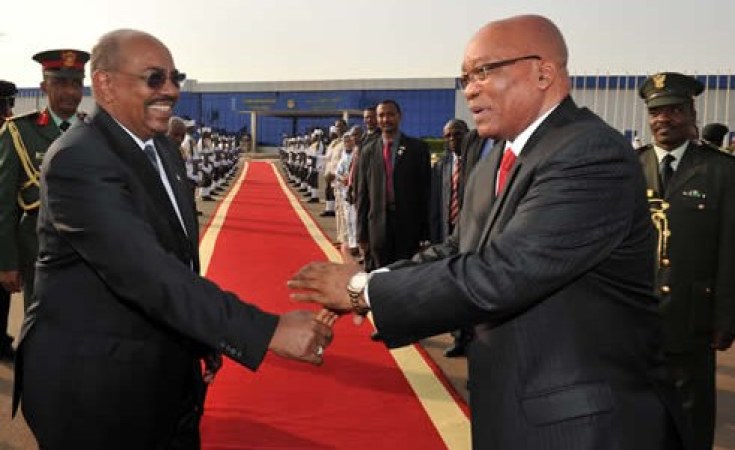Excerpts from the full text of the judgement of three judges of the South African High Court on the obligation of South Africa under international and domestic law to arrest Omar al-Bashir, under indictment on charges of genocide, war crimes and crimes against humanity by the prosecutor of the International Criminal Court (ICC).
28.13.1 The Rome Statute [which set up the ICC] gives effect to international human rights law and enables the prosecution of customary international law crimes. As such, its provisions enjoy pre-eminence in our constitutional regime. Moreover, it has been domestically enacted. Its binding status is clear.
.....
In... [an earlier case] .... Ngcobo, Chief Justice, enunciated the significance of International Law to the Constitution:
"Our Constitution reveals a clear determination to ensure that the Constitution and South African law are interpreted to comply with international law, in particular international human rights law… These provisions of our Constitution demonstrate that international law has a special place in our law which is carefully defined by the Constitution".
....
The decisions of the Supreme Court of Appeal.... and the Constitutional Court.... are binding legal authority that must be followed when considering disputes regarding the duties of this country arising from international law.
The Constitutional Court decision actually dispels any doubt about the duties of South Africa.... Crimes against humanity are referred to in... the Implementation Act [the 2002 South African law incorporating the duties imposed by the Rome Statute into South African law] and include those referred to in the first warrant of arrest issued against President Bashir.
....
... During the entire hearing (on Monday June 15) Adv Mokhari SC [the government's lawyer] repeatedly re-assured us that President Bashir was still in the country, which fact was necessary for the Court's jurisdiction. As it transpired later that day and after we handed down our order, all these assurances were not correct as President Bashir had, most probably left the country before argument commenced just before 13h00. We return to this aspect later.
The court concluded hearing argument just after 14h30 and handed down the order [requiring the government to take Bashir into custody].... at about 15:00. It is only then that the court was informed by Adv Mokhari SC that President Bashir had left the country. This, in our view, is a clear violation of the order handed down by Fabricius J on Sunday afternoon [an interim order preventing him from leaving the country while the court considered the case].
....
36.1 how was it possible that President Bashir would, with his whole entourage, travel from Sandton to Waterkloof Airbase, without any of the Respondents' knowledge?
36.2 how was it possible that the Sudanese plane would take off from the airbase without the Respondents knowing whether the President was on board or not?
36.3 how would that plane be able to land in Sudan by late afternoon if it had not departed at about noon that same day?
The answers suggest themselves, and without intending to pre-empt the proceedings that may follow once the affidavit this court has ordered is received, it is necessary, in the interests of justice and the rule of law to say the following:
The Respondents are quite aware of the provisions of ss 1 and 2 of the Constitution which declare that the State is founded on the supremacy of the Constitution and the rule of law. They are also aware of the constitutional enjoinder that international agreements bind the Republic, especially those that have been ratified (s. 231). They are obviously bound to comply with domestic legislation and obviously the Implementation Act. They must also be aware of s. 165 of the Constitution, which reads as follows:
"165 Judicial Authority
(1) The judicial authority of the Republic is vested in the courts.
(2) The courts are independent and subject only to the Constitution and the law, which they must apply impartially and without fear, favour or prejudice.
(3) No person or organ of state may interfere with the functioning of the courts.
(4) Organs of state, through legislative and other measures, must assist and protect the courts to ensure the independence, impartiality, dignity, accessibility and effectiveness of the courts.
(5) An order or decision issued by a court binds all persons to whom and organs of state to which it applies."
At this stage, on a common sense approach, there are clear indications that the order of Sunday 14 June 2015 was not complied with. It is in this reason that we are moved to state that:
A democratic State based on the rule of law cannot exist or function, if the government ignores its constitutional obligations and fails to abide by Court orders. A Court is the guardian of justice, the corner-stone of a democratic system based on the rule of law. If the State, an organ of State or State official does not abide by Court orders, the democratic edifice will crumble stone-by-stone until it collapses and chaos ensues.
JUDGE D MLAMBO
JUDGE PRESIDENT OF THE GAUTENG DIVISION OF THE HIGH COURT, PRETORIA
JUDGE A P. LEDWABA
DEPUTY JUDGE PRESIDENT OF THE GAUTENG DIVISION OF THE HIGH COURT, PRETORIA
JUDGE H. J. FABRICIUS
JUDGE OF THE GAUTENG DIVISION OF THE HIGH COURT, PRETORIA


